|
|
|
Anything Goes
1984
British Domestic Series
Presenter:
Keith Chegwin
Ringmaster:
Norman Barrett
Comedy Performer:
Tommy Fossett (as Grimble)
Referee:
Suzanne Dando
Referee's Assistant:
Karen Wragg
Musical Accompaniment:
Catch 51
Production Credits:
Choreographer: Sue Turner; Stage Managers: Bryan Chapman and Alex Thomas;
Videotape Editors: Ted Greagsby and Ian O'Shaughnessy;
Camera Supervisor: Dave Taylor;
Vision Supervisor: Jim Buddle;
Production Assistant: Anne Comer;
Make-up Designer: Lilias Munro;
Costume Designer: Jacki Pinks;
Sound: John Drake;
Engineering Manager: Ron Minty;
Lighting: Geoff Lomas; Games Deviser: Geoff Wilson;
Designer: David Wilson;
Assistant Producers: Carole Caldwell and Alan Wright;
Producer: Geoff Wilson;
Director: Keith Mackenzie
A BBC Manchester Production
|
Key:
Domestic Heats
● = Heat Winner
(No Final)
▲ = Promoted to Position / ▼ =
Demoted to Position |
|
|
GB |
Anything Goes 1984 |
Heat 1 |
|
Event Staged: Unknown
Venue:
The Tower Circus, The Tower, Blackpool, Lancashire, England
Transmission:
BBC1: Saturday 17th March 1984, 5.10-5.50pm Special
Guest: Franco Di Angelo (Italian 'cloud swinging' circus performer),
Ben Lester, a clown,
and the Coco-Tots (a dance troupe of fourteen young girls) |
|
Teams:
Cockermouth Farmers v. Melton Mowbray Farmers |
|
Team Members:
Cockermouth Farmers - Anne, Susan Bletch, Shirley Brook,
Neil Carruthers, Les McTeer, Dave Miller, Willie Roberts, Anne Robinson and
Helen Skelton;
Melton Mowbray Farmers - Richard Copley, Duncan, John
Ecclestone, Eileen, Wendy Fargate, John Herrick, Julie Ingram, Brian
Lovegrove, Peter Lovegrove and Theresa. |
|
Games: Clown
Tag, Knock Down the Cats, Eggstra Large Trousers, The Chickens on the Flying
Trapeze, The Chefs and the Food and What Do You Do With a Drunken Sailor? |
|
Game Results and Standings |
|
Result |
Team |
Points |
Final Scoreboard |
|
1st
2nd |
Melton Mowbray Farmers ●
Cockermouth Farmers |
8
4 |
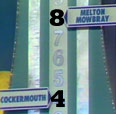 |
|
The Host
Town |
|
Blackpool,
Lancashire
Blackpool is a seaside town with 7 miles (11km) of sandy beach and a
population of around 144,000 inhabitants in the county of Lancashire. It is
located on the Irish Sea coast between the Ribble and Wyre river estuaries,
12 miles (19km) north of Southport, 14 miles (22km) north-west of Preston,
20 miles (32km) south-west of Morecambe and 61 miles (98km) west of Leeds.
In medieval times Blackpool emerged as a few farmsteads on the coast, the name
coming from "le pull", a stream that drained Marton Mere and Marton Moss into
the sea close to what is now Manchester Square. The stream ran through peat
bogs that discoloured the water, so the name for the area became "Black
Poole". The first house of any substance, Foxhall, was built toward the end of
the 17th century by Edward Tyldesley (1635-1685), the Squire of Myerscough and
son of royalist Sir Thomas Tyldesley (1612-1651).
Until the middle of the 18th century, Blackpool was simply a coastal hamlet,
but the practice of sea bathing to cure diseases was becoming fashionable
among the wealthier classes, and visitors began making the arduous trek to
Blackpool for that purpose. In 1781, Thomas Clifton (1727-1783) and Sir Henry
Hoghton (1728-1795) built a private road to Blackpool and a regular stagecoach
service from Manchester and Halifax was established. A few amenities,
including four hotels, an archery stall and bowling greens, were developed,
and the town grew slowly. The 1801 census records the town's population at 473
inhabitants.
The most significant event in the early growth of the town occurred in 1846,
with the completion of a branch line to Blackpool from Poulton on the main
Preston and Wyre Joint Railway line from Preston to Fleetwood. Around this
time, Fleetwood declined as a resort, as its founder and principal financial
backer, Peter Hesketh-Fleetwood (1801-1866), went bankrupt. In contrast,
Blackpool boomed. A sudden influx of visitors, arriving by rail, provided the
motivation for entrepreneurs to build accommodation and create new
attractions, leading to more visitors and a rapid cycle of growth throughout
the 1850s and 1860s. By 1851, the town's population had risen to over 2,500.
The growth was intensified by the practice among the Lancashire cotton mill
owners of closing the factories for a week every year to service and repair
machinery. These became known as ‘wakes weeks’. Each town's mills would close
for a different week, allowing Blackpool to manage a steady and reliable
stream of visitors over a prolonged period in the summer.
In 1863, the North Pier was completed, rapidly becoming a centre of attraction
for elite visitors. Central Pier was completed in 1868, with a theatre and a
large open-air dance floor. The town expanded southward beyond what is today
known as the Golden Mile, towards South Shore, and South Pier was completed in
1893, making Blackpool the only town in the United Kingdom with three piers.
In 1878, the Winter Gardens complex opened, incorporating ten years later the
Opera House, said to be the largest in Britain outside London.
Much of Blackpool's growth and character from the 1870s was due to the town's
pioneering use of electrical power. In 1879, it became the first municipality
in the world to have electric street lighting, as large parts of the promenade
were wired. The lighting and its accompanying pageants reinforced Blackpool's
status as the North of England's most prominent holiday resort, and its
specifically working class character. It was the forerunner of the present-day
Blackpool Illuminations. In 1885, one of the world's first electric tramways
was laid down as a conduit line running from Cocker Street to Dean Street on
the Promenade. The line was operated by the Blackpool Electric Tramway Company
until 1892 when their lease expired and Blackpool Corporation took over
running the line. A further line was added in 1895, from Manchester Square
along Lytham Road to South Shore, and the line was extended north to
Fleetwood. In 1899, the conduit system was replaced by overhead wires. The
tramway has remained in continuous service to this day and is the United
Kingdom’s only surviving first generation tramway stretching 11 miles (18km)
from the airport at Squires Gate all the way to Fleetwood.
By the 1890s, the town had a permanent population of 35,000 but could
accommodate 250,000 holidaymakers. The number of annual visitors, many staying
for a week, was estimated at three million. The decade also saw the opening of
two of the town's most prominent buildings, the Grand Theatre on Church
Street, and Blackpool Tower on the Promenade.
Documents have been found to suggest that the reason Blackpool escaped heavy
damage in World War II (1939-1945) was that Adolf Hitler (1889-1945) had
earmarked the town to remain a place of leisure after his planned invasion.
Despite this, on 11th September 1940, German bombs fell near Blackpool North
railway station and eight people were killed in nearby houses in Seed Street.
This site today is occupied by the new Town Hall offices and a Sainsbury's
supermarket. No plaque has ever been erected to remember the injured or dead.
The rise of package holidays in the late 1960s and 1970s took many of
Blackpool's traditional visitors abroad, where the weather was more reliably
warm and dry, and improved road communications, epitomised by the construction
of the M55 motorway in 1975, made Blackpool more feasible as a day trip rather
than an overnight stay. Despite this, the town’s economy, however, flourishes
relatively undiversified and firmly rooted in the tourism sector and remains
the most popular seaside resort in the country. However, the town has suffered
a serious drop in numbers of visitors which have fallen from 17 million in
1992 to 10 million today.
The three main tourist hotspots in Blackpool originally appeared as part of
the flourishing tourist industry. The first is Blackpool Tower which opened in
1894 and has been a dominant landmark of the Blackpool skyline since that
time. Inspired by the Eiffel Tower in Paris, France, it is 518ft 4in (158m) in
height (roughly half the size of its more famous original) and houses a
complex of leisure facilities, entertainment venues and restaurants, including
the world-famous Tower Ballroom and Tower Circus, at its base.
The second, Pleasure Beach Blackpool, originates back to around 1910 and
boasts rides including the Pepsi Max Big One which, between 1994 and 1996, was
the world's fastest and tallest complete circuit rollercoaster. It was the
country's most popular free attraction with 6 million visitors a year but has
lost over a million visitors since 1998 and has recently introduced a Ł5
entrance fee.
The third is the North Pier, the northern-most of Blackpool's three piers,
which includes a small shopping arcade, a small tramway and the North Pier
Theatre. The pier end also used to have a helicopter pad, but this was damaged
in a Christmas storm in 1997 and collapsed into the sea. |
|
The Venue |
|
The Tower Circus Ring
The recording venue of the entire series of Anything Goes
was the Tower Circus Ring at the base of the world famous Blackpool Tower,
between its four legs. The circus is lavishly decorated, in common with similar Victorian
era attractions, and opened to the public on 14th May 1894. The circus has run
there ever since, even surviving a potential closure in 1990 thanks to a surge
of public support in favour of its continuation. The space is not a
particularly large one, certainly not by IAK or JSF standards, and for this
reason, the games played were generally very simple and only involved a small
number of players at a time. Occasionally, the games even spilled over into
the public seating area in the auditorium, but this simply added to the fun.
Where the Tower Circus scored over other venues was in its hidden 35,000
imperial gallon water tank beneath the ring (incorrectly reported in the
programme by Keith Chegwin as having a capacity of 70,000 gallons!), which
would flood the arena to a depth of 4 foot 6 inches when the floor was
lowered. At least one game in each programme was played on water, usually the
last one, for obvious reasons! The Tower Circus is one of only four circus
rings remaining in the world that has this remarkable facility. |
|
Presenters, Officials and Production Team |
|
Series host Keith Chegwin had previously appeared as a participant in It's A
Celebrity Knockout 1977 and had returned in 1978 to present the winners'
trophy in It's A Miners Knockout. This latter programme had been
recorded at the same Blackpool Tower Circus venue that was utilised for
Anything Goes. Chegwin would go on to be a guest presenter of Heat 2 of
It's A Knockout in 1982 when the series visited Cockermouth in Cumbria and
then hosted It's A Knockout when it was re-launched in Great Britain by Channel 5
in 1999. |
|
Returning
Teams and Competitors |
|
Teams from Cockermouth and Melton Mowbray had competed in the
final series of It's A Knockout in 1982. Neither had been successful
and did not progress beyond their respective Domestic Heat. |
|
Looks
Familiar? |
|
Presenter Keith Chegwin was driven into the arena by circus
clown Ben Lester in his Keystone Kops-style jalopy which was prone to
falling apart and making loud bangs! Amongst the colourful characters seen on
stage as Lester and Chegwin entered the circus ring were performers in rabbit
and chimp costumes which had obviously come from the It's A Knockout
props store!
Eagle eyed It's A Knockout fans could be forgiven for thinking they had
seen many of the games in this heat before, or at least variations of them.
Game 2 - 'Knock Down the Cats' - bore a striking resemblance to 'The Corn Sack
Swing', seen in the 1974 Jeux Sans Frontičres event held in
Northampton, while Game 4 - 'The Chefs and the Food' - later became a
recurring game in the 1998 series of Jeux Sans Frontičres. |
|
Additional Information |
|
Teams in the first year of Anything Goes were composed of working
people, with each week's show being competed by members of a particular
profession.
The final game of the show - 'What Do You Do With a Drunken
Sailor?' - was the only game of the programme to be played on water.
The
winning team from Melton Mowbray received for their troubles a giant stick of
Blackpool rock, a traditional seaside confection, with the words "Anything
Goes" printed throughout its length. The team auctioned this prize off for
charity, with the proceeds going to cancer research. All competitors in the
1984 programmes received an engraved Anything Goes glass tankard as a
souvenir, regardless of whether they won or lost. |
|
Made
in Colour • This programme exists in the BBC Archives |
|
|
|
GB |
Anything Goes 1984 |
Heat 2 |
|
Event Staged: Unknown
Venue:
The Tower Circus, The Tower, Blackpool, Lancashire, England
Transmission:
BBC1: Saturday 24th March 1984, 5.10-5.45pm Special
Guests: The Flying Rochelles (French circus performers)
and the Coco-Tots (a dance troupe of fourteen young girls) |
|
Teams:
London Shop Assistants v. Manchester Shop Assistants |
|
Team Members:
London Shop Assistants - Andrew Byford, Steve Devine, Alvin
Du Pres, Melanie Green, Veronica Infante, Sue Jackson, Mark Nichol, Dave
Stevens and Debbie Tate;
Manchester Shop Assistants - Sally Brittain, Karen Duckworth,
Ray Gill, Beverley Holt, Gary Silva, Gill Sutcliffe, Matthew Tapp, Terry
Walker and David Wheatley. |
|
Games:
Elephant Football, The Blackpool Tower, Clown's Musical Chairs, Blindfolded
Balloon Bursting, Tap Hatters and Dressing the Dummies. |
|
Game Results and Standings |
|
Result |
Team |
Points |
Final Scoreboard |
|
1st
2nd |
London Shop Assistants ●
Manchester Shop Assistants |
8
4 |
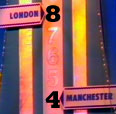 |
|
Presenters, Officials and Production Team |
|
Presenter Keith Chegwin was lowered into the arena sitting on top of a
parrot prop. Unfortunately, this gave him the perfect excuse to wheel out the
tired old joke about parrots and headache pills, complaining that they didn't
help as the parrots eat 'em all (paracetamol)!
|
|
Additional Information |
|
The
final game of the show - 'Dressing the Dummies' - was the only game of the
programme to be played on water.
The
winning team from London auctioned the Anything Goes stick of rock,
with the proceeds going to the charity, Help A London Child. |
|
Made
in Colour • This programme exists in the BBC Archives |
|
|
|
GB |
Anything Goes 1984 |
Heat 3 |
|
Event Staged: Sunday 22nd January 1984
Venue:
The Tower Circus, The Tower, Blackpool, Lancashire, England
Transmission:
BBC1: Saturday 31st March 1984, 5.20-6.00pm Special
Guests: The Marrakesh Troupe and the Coco-Tots,
(a dance troupe of fourteen
young girls) |
|
Teams:
Preston Police Force v. Stockport Police Force |
|
Team Members:
Preston Police Force - John Middleham. |
|
Games: Come
Dancing, The Chaingang, Pin the Tail on the Donkey, The Peckish Penguins, The
Jigsaw Puzzle. |
|
Game Results and Standings |
|
Result |
Team |
Points |
Final Scoreboard |
|
1st
2nd |
Preston Police Force ●
Stockport Police Force |
10
6 |
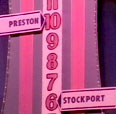 |
|
Additional Information |
|
At
the end of the competition, the Stockport team had registered just 2pts on the
scoreboard. However, as the team had entered into the spirit of the
competition, Keith Chegwin arbitrarily awarded them 2 bonus points for being
good sports, bringing the score to 10-4. Unexpectedly, referee Suzanne Dando
did likewise and for the same reason, meaning that their final score rose to
6pts. Preston's impressive victory was of course preserved despite this
gratuitous giving away of points.
|
|
Made
in Colour • This programme exists in the BBC Archives |
|
|
|
GB |
Anything Goes 1984 |
Heat 4 |
|
Event Staged: Sunday 29th January 1984
Venue:
The Tower Circus, The Tower, Blackpool, Lancashire, England
Transmission:
BBC1: Saturday 7th April 1984, 5.05-5.45pm Special
Guests: The Kaylicoa Family (Mexican circus performers)
and the Coco-Tots (a dance troupe of fourteen young girls) |
|
Teams:
Bournemouth Hoteliers v. Great Yarmouth Hoteliers |
|
Team Members:
Bournemouth Hoteliers - Sharon Mansell, David Martin, Ian
Thomas;
Great Yarmouth Hoteliers - Bob Christmas, David Durant, Pat Martin,
Betty Sadler. |
|
Games: The
Magicians and the Rings, Getting into Bed, The Bathing Beauties, The Ski-ing
Waiters, The Chefs and the Trifles, The Frogs and the Lilies. |
|
Game Results and Standings |
|
Result |
Team |
Points |
Final Scoreboard |
|
1st
2nd |
Bournemouth
Hoteliers ●
Great Yarmouth Hoteliers |
7
5 |
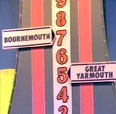 |
|
Made
in Colour • This programme exists in the BBC Archives |
|
|
|
GB |
Anything Goes 1984 |
Heat 5 |
|
Event Staged: Unknown
Venue:
The Tower Circus, The Tower, Blackpool, Lancashire, England
Transmission:
BBC1: Saturday 14th April 1984, 5.05-5.45pm Special
Guests: The Three Simets (Hungarian State Circus high wire performers)
and the Coco-Tots (a dance troupe of fourteen young girls) |
|
Teams:
Treharris Miners v. Westoe Miners |
|
Team Members:
Treharris Miners - Kevin Hall, Kevin Hughes, Susan James;
Westoe Miners - Jan Braminhoe, Peter Fowler, Graham Salem,
Paul Salem, Keith Simmons, Wendy Thomas. |
|
Games: The
Rabbits and the Carrots, The Coal Trolleys, The Football Boots, The Coal
Monkeys, Balloon Stuffing on Pontoons, Match the Shapes. |
|
Game Results and Standings |
|
Result |
Team |
Points |
Final Scoreboard |
|
1st
2nd |
Westoe Miners ●
Treharris Miners |
8
4 |
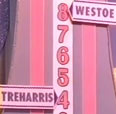 |
|
Made
in Colour • This programme exists in the BBC Archives |
|
|
|
GB |
Anything Goes 1984 |
Heat 6 |
|
Event Staged: Unknown
Venue:
The Tower Circus, The Tower, Blackpool, Lancashire, England
Transmission:
BBC1: Saturday 21st April 1984, 5.05-5.45pm Special
Guests: Tommy and Bobby Roberts Jnr and their Liberty Horses
and the Coco-Tots (a dance troupe of fourteen young girls) |
|
Teams:
Edinburgh Hospitals v. Leeds Hospitals |
|
Team Members:
Edinburgh Hospitals - Elaine Burr, Jan Cliff, Ronald Digger, Marion
Docherty, Richard Fairburn, Ian Gibson, John Hepburn, Irene Matheson, Winton
Permer, Jeannette Phelps;
Leeds Hospitals - Tim Bell, Ken Bird, Peter Draper, Anne
Dryden, Jackie Dryslham, Susan Fortune, Lynne Malling, Lee Sykes, Philip Wild. |
|
Games:
Applying the Bandages, Human Vaccuum Cleaners, Clown Tug-o'-War, Penguin Ice
Hockey, The Sinking Ships, The Spinning Plates. |
|
Game Results and Standings |
|
Result |
Team |
Points |
Final Scoreboard |
|
1st
2nd |
Edinburgh Hospitals ●
Leeds Hospitals |
11
1 |
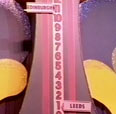 |
|
Made
in Colour • This programme exists in the BBC Archives |
|
|
|
JSFnetGB Series Guide pages researched by
Neil Storer and
Alan Hayes
with Ischa Bijl, Julien Dessy, Sébastien Dias, David Hamilton, Denis Kirsanov, Paul Leaver, Philippe Minet,
Christos Moustakas, David Laich Ruiz, Marko Voštan and JSFnet Websites |
|
|